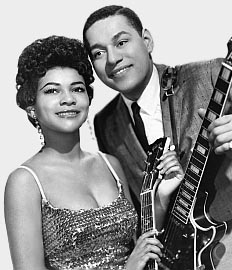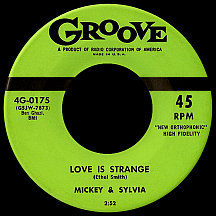MICKEY AND SYLVIA
Love is Strange
They say love is strange (or it can be). Not that Mickey and Sylvia would know, as their relationsip was strictly business, the duo's hit song "Love is Strange" nothing more than a convincing act. McHouston Baker of Louisville, Kentucky was a top-notch guitarist (he rarely left the house without his axe); "Mickey" was a key part of literally hundreds of recording sessions, appearing on records we've all heard but seldom realized his riffs were the ones we thrilled to! He shared his musical knowledge as well, teaching guitar as a sideline. His fiery-fret technique places him in the elite group of '50s rock guitar pioneers, alongside B.B. King, Chuck Berry, Link Wray and others.
New Yorker Sylvia Vanderpool, on the other hand, studied piano early in life (she was nearly ten years younger than Baker) and was driven to do it all: sing, play piano, and ultimately work her way up the ladder to become a record executive. Her recording career began at age 14 on a Columbia 78 with trumpeter Orrin "Hot Lips" Page and The Magichords (her last name misspelled "Vanterpool" on the label); "Chocolate Store Blues" bore more than a passing similarity to Toni Harper's 1948 hit "Candy Store Blues," also on Columbia (Toni was even younger, just eleven...a tender age to be singing such mature lyrics!), and was followed by the more sincere "I Was Under the Impression (That You Loved Me)." As Little Sylvia, she waxed a disc for Savoy in '51 with Heywood Henry's orchestra ("Little Boy"), shortly before Mickey's simmering instrumental "Riverboat" appeared on the same label
She recorded a few sides for Jubilee Records with saxophonist Buddy Lucas (and his Band of Tomorrow) that ran the gamut from a cover of the Jessie Mae Robinson weeper "I Went to Your Wedding" (a number one hit for Patti Page in '52) to hotter rhythmic offerings like "Drive Daddy Drive." Mickey and Sylvia first joined forces in early 1954 with "Fine Love" (a Rudy Toombs tune) on Cat, a subsidiary of Atlantic, which may explain its similarity to the style of top star Ruth Brown. The pair moved together to the small Rainbow label; "Bandstand Stomp," credited to Mickey "Guitar" Baker and his House Rockers, preceded three M&S singles of varying tone ("I'm So Glad," "Rise Sally Rise" and "Where is My Honey?"), establishing them as a somewhat unconventional duo by mid-'50s standards. Mickey continued his session work for Atlantic and other companies and backed pop girl group The Bonnie Sisters on their early '56 Rainbow Records hit "Cry Baby."
Sylvia, fascinated by Mickey's fluent guitar technique, began practicing under his tutelage and before long they were both toting guitars onstage; she mainly played rhythm but would sometimes join him in a dual lead, just one more quality that made them stand apart from other male-female acts. RCA Victor signed them in '56 and they got things rolling with a rocker, "No Good Lover," issued on the company's Groove label. When the single inexplicably failed, they followed with "Love is Strange," its songwriting credited to Ethel Smith (also known as Mrs. Bo Diddley) and produced by Billboard magazine writer and Groove founder Bob Rolontz. The song, with its catchy guitar riffs, unison vocals and appealing 'Mmm-mmm'...'Yay, yay!' asides, caught on late in the year, peaking high on the pop and R&B charts in the early months of 1957.
RCA discontinued Groove; Mickey and Sylvia moved to the Vik label and set to the task of producing another hit. Each side of the next single stuck to the formula of the breakthrough tune and both charted; "There Oughta Be a Law" was the uptempo side and "Dearest" took a more leisurely pace. "Bewildered," and late-'30s composition by Teddy Powell and Leonard Whitcup, had been recorded successfully by several artists over the years (hit "Race Records" versions in 1948 by The Red Miller Trio and Amos Milburn the best-known); after a yearlong drought it was a mid-chart hit for Mickey and Sylvia in the summer of '58. Their conflicting goals (he just wanted to play and sing, she had ambitions beyond performing) caused a split by the end of the year.
Baker indulged himself by recording an LP for Atlantic, The Wildest Guitar, a collection of 12 not-always-rocking tracks that exhibit his six-string versatility; the album's single was a reworking of Anton Karas's "Third Man Theme," the title tune from the innovative and award-winning 1949 film. He surprised many by forming a duo with Kitty Noble (her tenuous claim-to-fame a '54 single for Herald, "Wait Till the Cows Come Home"); to their credit, two 1959 Mickey and Kitty releases for Atlantic ("Ooh-Sha-Lala" and "First Love") sounded nothing like previous Mickey B. and Sylvia V. songs.

In 1960, the "Love is Strange" duo gave it another go. They picked up where they'd left off and scored a hit on the second try; "What Would I Do," a sweet-sounding song with strings on RCA Victor, nearly reached the top 40 in early 1961, the best they'd done since the first big splash four years earlier. A remake of Shirley and Lee's "That's What I'll Do" from '55, it was backed by "This is My Story," a song also popular in '55 by another of their contemporaries, Gene and Eunice. After yet another label switch within RCA's corporate structure, M&S appeared on Willow with "Baby You're So Fine" (taking Joe and Ann's recent hit for Ace, "Gee Baby," and altering it a bit), enjoying airplay and moderate sales with the tune and its flip, "Lovedrops," in the summer of '61.
Miss Vanderpool married entrepreneur Joe Robinson and performed often at his Blue Morocco club in the Bronx, with and without Mr. Baker, over the next few years. Mickey had a single on King, "Oh Yeah, Ah, Ah," and cranked out instrumental and vocal tracks other labels; he was intrigued by the jazz scene in Paris, France during a trip there in 1962. Back home, Sylvia teamed with future "Sunny" star Bobby Hebb (recording as Bobby and Sylvia) for a one-shot single, "You Broke My Heart and I Broke Your Jaw," on the Battle label. She reunited with Mickey one more time with "Let's Shake Some More" (a soul-style update of Shirley and Lee's "Let the Good Times Roll") and one other 1965 single, "Fallin' in Love," before Mickey set up permanent residency in France, retaining his association with RCA and releasing a number of records that graduallty leaned in a jazz direction.
In 1967, Sylvia Robinson had a solo single, "Oo-Wee Baby," on a small New Jersey label, Tru-Glo-Town. Shortly afterwards she and husband Joe started All Platinum Records (initially just Platinum), releasing 45s by a number of new artists including two by Mickey and Sylvia, though it was obvious Mickey Baker wasn't singing on the tracks (another new "Mickey" joined her for a cover of The Beatles' "Rocky Raccoon" on Stang, an All Platinum subsidiary). In 1969, she and Bert Keyes wrote and produced "Love on a Two-Way Street" for former Jaynetts singer Lezli Valentine; a year later it became a million seller for one of Sylvia's discoveries, Washington, D.C. group The Moments. Later she scored an even bigger hit than her "Strange" smash of '57, moaning and whispering throughout the provocative "Pillow Talk" on another of her labels, Vibration; in the spring of 1973 it went top ten pop and hit number one on the Soul Singles (formerly R&B) chart. The Robinsons started Sugar Hill Records in the late '70s, setting the precedent for rap music in the top 40 with the '79 hit "Rapper's Delight" by The Sugarhill Gang.
Today, "Love is Strange" is an often-heard standard enjoying regular exposure in the media. Its impact back in the day led to other popular versions including Buddy Holly's softly-delivered rendition from 1958, a minor hit eleven years later when it was remixed with keyboard string effects. Sonny and Cher (under their Caesar and Cleo alias) did the song in 1964 and The Everly Brothers followed suit in '65, notching a hit in Great Britain. A remake from 1967 took the song to a place even Mickey and Sylvia hadn't: 'Sylvia?'...'Yes, Mickey?'...'How do you call your lover boy?'...'Come here, lover boy!' began a spoken segment that closed the original hit. Peaches and Herb covered both sides of the routine, giving the song closure at last: 'Herbie?'...'Yes, Peaches?'...'How do you call your lover girl?'...'Well, I say hey, lover girl!' and so on. It was the second most successful version of the classic song.


